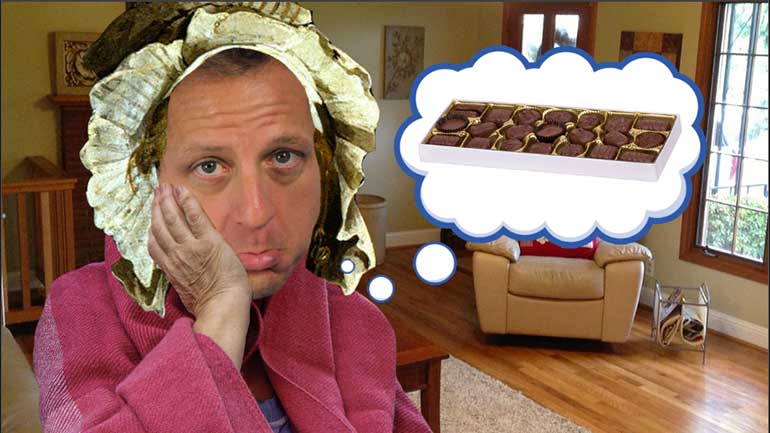ShmoopTube
Where Monty Python meets your 10th grade teacher.
Search Thousands of Shmoop Videos
Modern World History 2.5 The Enlightenment 334 Views
Share It!
Transcript
- 00:03
How many philosophers does it take to screw in a lightbulb? [Philosophers sitting down by a lamp and light bulb]
- 00:06
Well, we're going to go with zero--not only because there weren't any lightbulbs
- 00:10
during the Age of Enlightenment, save for the ones that popped up above
- 00:13
people's heads periodically, but because no philosopher worth his salt would be
- 00:17
caught dead doing something as mundane is changing a light bulb... you know, when
Full Transcript
- 00:21
there was so much thinking to do. Okay yeah we're not the best at jokes. Sue us.
- 00:25
That's what seventeenth and eighteenth centuries in Western Europe were all [Statues of Rousseau and voltaire appear]
- 00:28
about: thinking, thinking, and then thinking some more. The Enlightenment got
- 00:32
it's thoughtful foundations from some gentlemen who lived during the 1600s. Sir
- 00:37
Francis Bacon is credited with the scientific method, though why he didn't study
- 00:41
his namesake, well, we'll never know. René Descartes is considered to be both the
- 00:45
father of modern philosophy and of analytical geometry. We bet those twins [Twins crying in a cot]
- 00:50
really kept him up at night. And while John Locke's writings serve as the
- 00:54
philosophical underpinning of America's Declaration of Independence, he's also
- 00:58
famous for promoting the idea that the mind is a tabula rasa, or blank slate, at
- 01:04
birth. It's also pretty rasa during any late afternoon class, or is it more like a [Boy sleeping in class]
- 01:08
tabula nap-a. The ideas of these philosophers and others like them were
- 01:12
taken up in the 18th century to support the belief that human society is always
- 01:15
chugging along and getting better. Progress didn't stop with the Romans and
- 01:19
the Greeks the way some people in the 1700s believed. After all, did the Greeks and
- 01:23
Romans have Nutella? We don't think so. But it wasn't just delightful [Boy with a plate of nutella outside Greek building]
- 01:27
hazelnut goodness that led folks in the 18th century to believe that each new
- 01:31
generation of humanity would make society better than it had before.
- 01:34
Education there helped as well. As men and women became more literate and less ignorant, [Woman reading a book]
- 01:38
they stopped believing in witches and worrying about the devil so much, much to
- 01:43
the concern of the devil's PR team. France was the HQ of the Age of
- 01:47
Enlightenment. Philosophers, or French intellectuals--you know, many of whom were
- 01:51
broke--spent their days talking about philosophy and literature. When the
- 01:55
government got edgy about all the critiquing these philosophers were doing
- 01:58
and tried to enact censorship laws, well the French just started speaking and [French philosophers in a meeting]
- 02:03
writing satirically and, well, never stopped. But the philosophers, or "philosophes,"
- 02:07
didn't just focus on using humor to ridicule those in charge. They also
- 02:12
talked about all the stuff that was wrong in society, much of which they
- 02:15
believed could be blamed on the terribleness of the class system. Well,
- 02:19
to philosophes who did a lot to transform all this smack-talking into [Statue of liberty appears]
- 02:22
ideas that underpin modern democracy were Montesquieu and Rousseau. Montesquieu, who
- 02:28
was a nobleman and a lawyer, articulated the theory that the power in a
- 02:31
government should be distributed between its different branches. He also talked a
- 02:35
lot about despots... Hey, everyone has their own weird hobby. Well, Rousseau [Despot appears in a field]
- 02:39
wrote novels, music, tracts on education, and "The Social Contract." The dude was
- 02:45
busy. Well, "The Social Contract" argued that if people would join together as
- 02:49
members of a civil society and submit themselves to the will of the whole, then
- 02:52
individuals would be free of the tyranny of others and would have a shot at
- 02:56
writing laws they could live with. In other words, go read the book: it's kind [The Social Contract book appears]
- 03:00
of a big deal. By the end of the Age of Enlightenment, enlightened people
- 03:03
everywhere believed that, hey, not only could they run this whole government
- 03:07
thing, but they had a right to govern themselves. Additionally, all the white
- 03:11
guys in power started to think that maybe they could see themselves being
- 03:14
equal to other white guys of different face or social classes... that's progress,
- 03:17
right? Finally, the Age of Enlightenment got people to buy into the concept that
- 03:21
a sound government, no matter what flavor that sound government came in, was the [Boy with multiple flavored ice cream]
- 03:25
surest guarantor of life, liberty, and the pursuit of Pokémon. We personally hope
- 03:30
the sound government comes in mint chocolate.
Up Next
GED Social Studies 1.1 Civics and Government
Related Videos
When you're about to marry the love of your life, not many things could stop you. However, finding out that your future hubby is keeping his crazy...
Here at Shmoop, we work for kids, not just the bottom line. Founded by David Siminoff and his wife Ellen Siminoff, Shmoop was originally conceived...
ACT Math: Elementary Algebra Drill 4, Problem 5. What is the solution to the problem shown?




